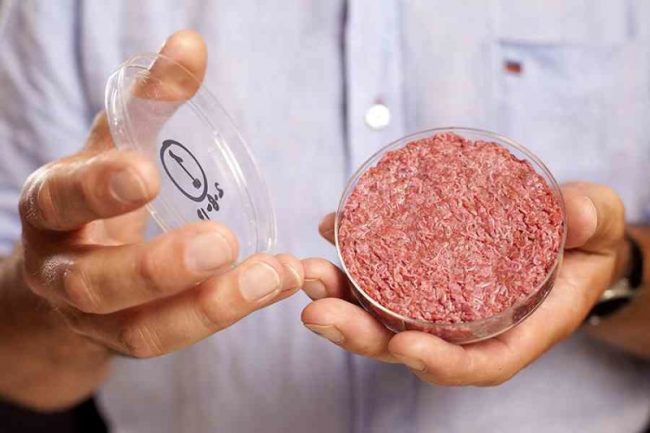Now that there may be lab-grown meat, the question is whether or not Vegans will feel compelled to eat such a product . The lab-grown meat would still be as if one were actually eating real animal meat.
https://www.livekindly.co/meat-company-bill-gates-lab-grown-meat-investors/
Memphis Meats, an alternative meat startup, has recently finished a
round of fundraising and they gained support from some big names. Major
meat packer, Cargill was one of the contributors to the $17 million that the company obtained. Alongside Cargill, Bill Gates and Richard Branson also chose to invest in the company.
Memphis Meats are currently working on lab grown meats. This meat is grown in tanks from the cells of the animals that the meat traditionally comes from. These cells are then fed nutrients in order to grow muscle tissue which will then be consumed as meat. Although their product isn’t available on the market yet, they have successfully produced chicken, beef and duck.

Startups like Memphis Meats aim to solve the world’s protein problem. Currently, the earth’s population are consuming more meat than is sustainable. Animal agriculture is devastating to the environment. As the earth’s population is set to increase until 2050, and the world’s appetite for meat continues to grow, this is presenting a huge problem.
Many people have turned to a plant-based diet to tackle the issue, but for people who love the taste of meat, they can’t see this being an option. Companies Impossible Foods and Beyond Meat have both created burgers out of plants that are supposed to replicate ‘the real thing’. However, for some people Memphis Meats’ creations might be one step closer to the real thing as it is grown out of the same cells that can be found in the meat they currently buy.

Cargill’s decision to invest in Memphis Meats, and ‘expand[ing]’ their consumers ‘protein choices’, mirrors Tyson’s move to invest in Beyond Meat. This suggests that meat companies are experiencing the effects of the public’s changing opinion on meat.
Although some animal rights activists are still concerned about the ethics of lab grown meat, it could be seen as a stepping stone to reducing the harm caused to animals. If lab grown meat became popular, as big investors appear to believe it will, it could dramatically reduce the number of farms which would have a positive ethical and environmental impact.
Image credit: Flickr | Gizmodo | Impossible Foods
Memphis Meats are currently working on lab grown meats. This meat is grown in tanks from the cells of the animals that the meat traditionally comes from. These cells are then fed nutrients in order to grow muscle tissue which will then be consumed as meat. Although their product isn’t available on the market yet, they have successfully produced chicken, beef and duck.

Startups like Memphis Meats aim to solve the world’s protein problem. Currently, the earth’s population are consuming more meat than is sustainable. Animal agriculture is devastating to the environment. As the earth’s population is set to increase until 2050, and the world’s appetite for meat continues to grow, this is presenting a huge problem.
Many people have turned to a plant-based diet to tackle the issue, but for people who love the taste of meat, they can’t see this being an option. Companies Impossible Foods and Beyond Meat have both created burgers out of plants that are supposed to replicate ‘the real thing’. However, for some people Memphis Meats’ creations might be one step closer to the real thing as it is grown out of the same cells that can be found in the meat they currently buy.

Cargill’s decision to invest in Memphis Meats, and ‘expand[ing]’ their consumers ‘protein choices’, mirrors Tyson’s move to invest in Beyond Meat. This suggests that meat companies are experiencing the effects of the public’s changing opinion on meat.
Although some animal rights activists are still concerned about the ethics of lab grown meat, it could be seen as a stepping stone to reducing the harm caused to animals. If lab grown meat became popular, as big investors appear to believe it will, it could dramatically reduce the number of farms which would have a positive ethical and environmental impact.
Image credit: Flickr | Gizmodo | Impossible Foods


